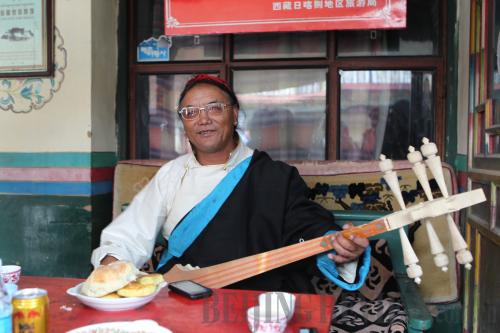|
 |
|
HOSPITABLE HOST: Lodre plays his dranyan, a six-stringed plucked instrument, to entertain guests in his hotel (DONG FANG) |
As dusk began to settle over the day, Yang Congbing and his friend rode the last few kilometers into Lhaze, a county in the southwest of Tibet Autonomous Region, where the Yarlung Zangbo River runs. After comparing a few hotels along a major street, they chose an unassuming one to spend the night.
"We hope to explore the original state of the plateau, and the real life and culture of Tibetans," said Yang, 38, who is from east China's Anhui Province. He and his tour pals had set off from Lhasa, capital of Tibet, and planned to go to Kathmandu, Nepal, by bike.
"The Tibetan-style decor of the small hotel appealed to us at first sight," Yang said. "It's much different from modern ones and we wanted somewhere authentic."
Paintings on the walls at the gate of the small inn depict folk legends, immersing visitors into the Tibetan world. Inside, entering into a small courtyard surrounded by two-story guest rooms, a colorful wooden box stands in the center of the yard. The container, called a chemar, with butter and roasted barley flour mixture inside, is a propitious object for Tibetans and is typically used during the Tibetan New Year. Guests are welcomed to approach it by the owner, and are invited to pray to heaven and the earth; highland barley wine is also served in a big copper pot next to the Chemar box, and guests can perform blessings for their families and friends by dipping their fingers into the wine and splashing it into the air. According to locals, this is the traditional way to pray during the Tibetan New Year. Thus, this special welcoming ceremony gives visitors a real sense of culture and place.
Several tables and chairs are located off to one side of the yard, just outside the kitchen. There, Tibetan butter tea and sweet milk tea, along with traditional cakes and snacks, are served. Guests can relax here after a long day of travel, tasting these authentic Tibetan refreshments and enjoying songs and dances performed by local residents. The owner, a hospitable 54-year-old Tibetan man named Lodre, plays his dranyan, a six-stringed plucked instrument, on occasion to entertain his guests.
Sitting in the yard, listening to the music and chatting with other guests, Yang said that he felt lucky to have found such a special inn. "Few people come here because they fear the high altitude, which is above 3,000 meters. I will definitely be recommending this hotel to friends who also dream of adventure in Tibet."
Entrepreneurial spirit
Word-of-mouth recommendations are the most common way people hear about this small hotel, according to Lodre, who was the first farmer in Tibet to open a family inn in 1999.
The idea of running a hotel came from his family's experience in the transportation business, for both goods and tourists, some 15 years ago. By meeting visitors from outside the area, Lodre and his brothers saw the need for people to have a place to stay in Lhaze. They then sold their truck for 100,000 yuan ($16,150) to raise money for opening a hotel. This plan was strongly supported by the local government. Not only was the brothers' application approved, they were also granted a 20,000-yuan ($3,230) subsidy. When construction of the hotel was completed, it was smaller than the current one, and they decided to name it a farmer's hotel.
Even early on in its operation, opening the hotel proved to be the right choice. It was widely welcomed by tourists. "Besides domestic tourists, we accept many foreign guests, especially from Australia. Foreign tourists account for about 60 percent of our customers," Lodre said.
|
